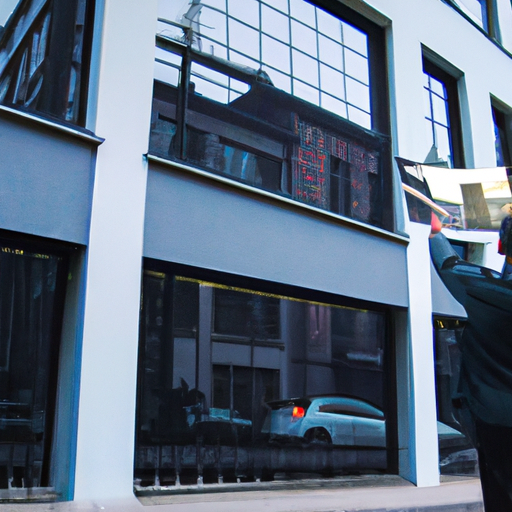Navigating Modern Complex Building Design: The Essential Role of a Design Advisor
The modern complex building journey is an intricate and multifaceted process that requires a high level of expertise, creativity, and collaboration. As the world of architecture and design continues to evolve, the need for a design advisor has become increasingly essential. A design advisor is a professional who provides expert guidance and support throughout the design and construction process, ensuring that the final product is both aesthetically pleasing and functional. This article will explore the role of a design advisor in your modern complex building journey, highlighting the importance of their involvement in navigating the complexities of modern design.
One of the primary responsibilities of a design advisor is to help clients define their vision and objectives for the project. This involves understanding the client’s needs, preferences, and budget, as well as the site’s constraints and opportunities. By working closely with the client, the design advisor can help to establish a clear and coherent design brief that will serve as the foundation for the project. This is a crucial step in the process, as it ensures that all parties involved have a shared understanding of the project’s goals and expectations.
Once the design brief has been established, the design advisor plays a critical role in the selection of the design team. This includes identifying and evaluating potential architects, engineers, and other consultants who have the necessary skills and experience to bring the client’s vision to life. The design advisor will also help to facilitate communication and collaboration between the various team members, ensuring that everyone is working towards the same objectives and that the design process runs smoothly.
As the design process unfolds, the design advisor will act as a sounding board for the client and the design team, providing valuable feedback and guidance on the various design options and proposals. This may involve reviewing drawings, models, and other design materials, as well as attending meetings and presentations to ensure that the project is progressing as planned. The design advisor will also help to identify any potential issues or challenges that may arise during the design process, and work with the team to develop appropriate solutions.
In addition to their involvement in the design process, the design advisor will also play a key role in the construction phase of the project. This includes reviewing construction documents and specifications to ensure that they align with the design intent, as well as monitoring the construction process to ensure that the project is being built according to the approved plans. The design advisor will also help to manage any changes or modifications that may be required during construction, ensuring that they are properly documented and communicated to all parties involved.
Finally, the design advisor will help to ensure that the completed project meets the client’s expectations and fulfills the objectives outlined in the design brief. This may involve conducting a post-occupancy evaluation to assess the building’s performance and identify any areas for improvement, as well as providing ongoing support and advice to the client as they settle into their new space.
In conclusion, the role of a design advisor in your modern complex building journey is essential in navigating the complexities of modern design. By providing expert guidance and support throughout the design and construction process, the design advisor helps to ensure that the final product is both aesthetically pleasing and functional, ultimately contributing to the success of the project. As the world of architecture and design continues to evolve, the need for a design advisor will only continue to grow, making their involvement in the modern complex building journey more important than ever.
Design Advisors: Bridging the Gap Between Vision and Reality in Modern Complex Buildings

The role of a design advisor in your modern complex building journey is a crucial one, as they bridge the gap between vision and reality in the creation of contemporary structures. Design advisors are professionals who possess a unique blend of skills, knowledge, and experience in architecture, engineering, and construction. They are responsible for guiding clients through the complex process of designing and constructing modern buildings, ensuring that the final product meets the client’s needs, expectations, and budget.
One of the primary responsibilities of a design advisor is to help clients define their vision for the project. This involves understanding the client’s goals, needs, and preferences, as well as the constraints and opportunities presented by the site and its surroundings. The design advisor must then translate this vision into a coherent design concept that can be developed into a detailed architectural plan. This process requires a deep understanding of the principles of modern architecture, as well as the ability to communicate effectively with clients and other stakeholders.
Design advisors also play a critical role in the selection of materials, systems, and technologies that will be used in the construction of the building. This requires a thorough understanding of the performance characteristics, costs, and environmental impacts of various options, as well as the ability to balance these factors against the client’s needs and preferences. The design advisor must also be familiar with the latest trends and innovations in the field of sustainable design, as many clients are increasingly seeking to incorporate green features and technologies into their projects.
Another important aspect of the design advisor’s role is to ensure that the project complies with all relevant codes, regulations, and standards. This includes not only building codes and zoning regulations but also accessibility standards, energy efficiency requirements, and other sustainability-related guidelines. The design advisor must be well-versed in these requirements and be able to navigate the often complex and time-consuming process of obtaining the necessary permits and approvals.
In addition to their technical expertise, design advisors must also possess strong project management skills. They are responsible for coordinating the efforts of various consultants, contractors, and other professionals involved in the project, ensuring that the design is executed according to the client’s vision and within the established budget and timeline. This requires the ability to manage schedules, budgets, and resources effectively, as well as the ability to anticipate and resolve potential conflicts and challenges that may arise during the course of the project.
Finally, design advisors serve as the client’s advocate throughout the entire building process, ensuring that their interests are protected and their vision is realized. This may involve negotiating with contractors and suppliers, reviewing and approving design changes, and overseeing the quality of the work being performed. The design advisor must also be prepared to provide ongoing support and guidance to the client, even after the project is completed, to ensure that the building continues to meet their needs and expectations.
In conclusion, the role of a design advisor in your modern complex building journey is a multifaceted one, requiring a unique combination of technical expertise, project management skills, and client advocacy. By bridging the gap between vision and reality, design advisors play a critical role in the successful completion of modern complex buildings, ensuring that these structures not only meet the needs of their occupants but also contribute to the advancement of sustainable design and construction practices. As you embark on your own modern complex building journey, consider engaging the services of a design advisor to help guide you through the process and ensure that your project is a success.
The Impact of Design Advisors on Sustainability and Efficiency in Modern Complex Building Projects
The role of a design advisor in your modern complex building journey is a crucial one, as they can significantly impact the sustainability and efficiency of your project. Design advisors are professionals who specialize in providing guidance and advice on various aspects of building design, from the initial concept stage to the final construction phase. They work closely with architects, engineers, and other stakeholders to ensure that the building meets the highest standards of sustainability, energy efficiency, and overall performance. In this article, we will explore the various ways in which design advisors can contribute to the success of your modern complex building project.
One of the primary responsibilities of a design advisor is to help clients identify and prioritize their sustainability goals. This involves conducting a thorough analysis of the project’s requirements, constraints, and opportunities, as well as researching and recommending the most appropriate design strategies and technologies. By doing so, design advisors can help clients make informed decisions about the materials, systems, and processes that will be used in the construction of their building, ultimately resulting in a more sustainable and efficient end product.
Design advisors also play a critical role in the development of a building’s energy strategy. This includes assessing the potential for renewable energy generation, such as solar panels or wind turbines, as well as identifying opportunities for energy conservation and efficiency improvements. By working closely with engineers and other specialists, design advisors can help to optimize the building’s energy performance, reducing its carbon footprint and operational costs.
Another key aspect of a design advisor’s role is to ensure that the building’s design is adaptable and resilient. This means considering the potential impacts of climate change, such as increased temperatures, extreme weather events, and rising sea levels, and incorporating appropriate measures to mitigate these risks. For example, a design advisor might recommend the use of flood-resistant materials and construction techniques, or the inclusion of green roofs and walls to help manage stormwater runoff and reduce the urban heat island effect.
In addition to their technical expertise, design advisors also bring a valuable perspective on the human experience of the built environment. They can help to create spaces that are not only functional and efficient but also comfortable, healthy, and enjoyable for occupants. This might involve advising on aspects such as indoor air quality, natural lighting, and acoustics, as well as considering the psychological and social impacts of the building’s design.
Design advisors can also contribute to the long-term success of a building project by helping to establish effective communication and collaboration between the various stakeholders involved. This includes facilitating workshops, meetings, and other forums for discussion and decision-making, as well as providing ongoing support and guidance throughout the design and construction process. By fostering a culture of open dialogue and shared learning, design advisors can help to ensure that the project’s sustainability and efficiency goals are met and that any challenges or obstacles are addressed in a timely and effective manner.
In conclusion, the role of a design advisor in your modern complex building journey is a multifaceted one, encompassing a wide range of responsibilities and areas of expertise. From setting sustainability goals and developing energy strategies to ensuring adaptability and resilience, design advisors play a critical role in shaping the success of your project. By working closely with architects, engineers, and other stakeholders, they can help to create buildings that are not only environmentally responsible and efficient but also comfortable, healthy, and enjoyable for occupants. As the demand for sustainable and efficient buildings continues to grow, the expertise and guidance provided by design advisors will become increasingly important in ensuring the success of modern complex building projects.
Q&A
Question 1: What is the role of a design advisor in the modern complex building journey?
Answer: A design advisor plays a crucial role in the modern complex building journey by providing expert guidance on design concepts, materials, sustainability, and functionality. They collaborate with architects, engineers, and clients to ensure that the building design meets the project’s objectives, budget, and timeline while adhering to aesthetic, environmental, and regulatory standards.
Question 2: How does a design advisor contribute to the decision-making process during the building journey?
Answer: A design advisor contributes to the decision-making process by offering informed recommendations on various aspects of the building design, such as layout, materials, energy efficiency, and accessibility. They help clients make informed choices by presenting multiple design options, analyzing their pros and cons, and ensuring that the final design aligns with the client’s vision, budget, and long-term goals.
Question 3: What are the key benefits of involving a design advisor in the modern complex building journey?
Answer: Involving a design advisor in the modern complex building journey offers several benefits, including:
1. Enhanced design quality: Design advisors bring specialized knowledge and expertise, ensuring that the building design is aesthetically pleasing, functional, and sustainable.
2. Cost savings: By providing guidance on materials, construction methods, and energy-efficient solutions, design advisors can help clients save on construction and operational costs.
3. Improved decision-making: Design advisors help clients make informed decisions by presenting multiple design options and analyzing their implications on the project’s objectives, budget, and timeline.
4. Compliance with regulations: Design advisors ensure that the building design adheres to local building codes, environmental regulations, and accessibility standards.
5. Streamlined project management: Design advisors collaborate with architects, engineers, and other stakeholders to ensure smooth communication and coordination throughout the building journey.
Conclusion
In conclusion, the role of a design advisor in your modern complex building journey is crucial as they provide expert guidance, ensure efficient use of resources, and help in achieving a balance between aesthetics and functionality. Their expertise in sustainable design practices, knowledge of building codes and regulations, and ability to collaborate with various stakeholders make them an indispensable part of the building process, ultimately contributing to the successful completion of a modern complex building project.


